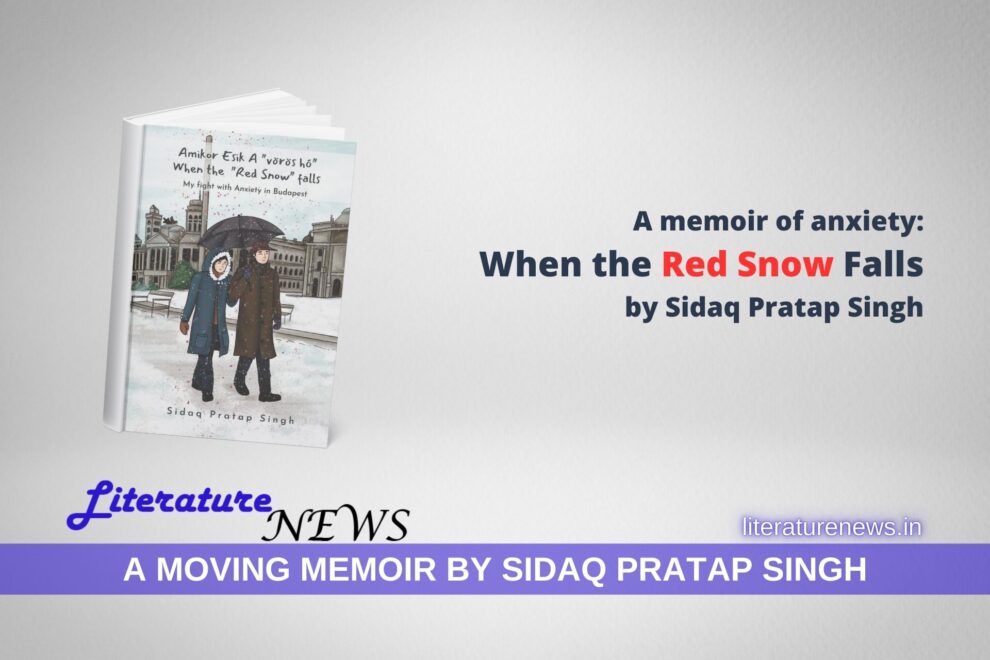Memoirs are always refreshing! While there may be the amalgamations of experiences, the good and the bad, reading a memoir takes us straight into the depth of an author’s memories. I recently had the opportunity to read a newly published memoir by Sidaq Pratap Singh. In a candid and moving new memoir titled “When the “Red Snow” Falls: My Fight with Anxiety in Budapest”, the Indian author delves into the harrowing experiences that marked his time in Hungary’s capital. The book, published by Notion Press in 2024, explores an outsider’s emotional and psychological turmoil in an often unwelcoming environment.
Singh’s memoir, written in a first-person narrative and interspersed with occasional Hungarian phrases, offers readers a raw and unfiltered glimpse into his challenges while studying film-making in Budapest. What was intended to be a journey of artistic growth and academic achievement soon turned into a struggle for mental well-being, as Singh found himself grappling with anxiety and discrimination in a foreign land.
The title, When the “Red Snow” Falls, is a metaphorical expression that hints at the surreal and unsettling experiences Singh endured. The subtitle, My Fight with Anxiety in Budapest, provides a more unambiguous indication of the book’s central theme: the author’s intense struggle with mental health, exacerbated by the racial hostility and cultural alienation he faced.
Singh’s account is deeply personal, beginning with his excitement at the prospect of studying cinema in Budapest, a city renowned for its rich cultural history. However, as early as the third chapter, the tone shifts to one of discomfort and anxiety. Singh recounts incidents of racial abuse, professors’ discrimination, and a pervasive sense of isolation that left him questioning his decision to pursue his dreams in a foreign country.
The memoir is structured into twenty chapters, each chronicling a different aspect of Singh’s experience. In one of the most harrowing sections of the book, the author describes his contemplation of suicide—a tragic testament to the depth of his despair. That description reveals the dark thoughts that plagued him during his time in Budapest.
Despite the gravity of the subject matter, Singh’s narrative is not without moments of fun and reflection. He shares anecdotes from his life in Hungary, including outings with friends and a memorable visit to a cemetery, which he discusses in Chapter 11. The unique chapter, Dance India Dance, stands out for its humorous yet poignant depiction of the author’s struggle to navigate cultural misunderstandings and personal anxieties.
Beyond his personal battles, Singh also touches on broader social issues in Hungary, such as the country’s controversial 2021 anti-LGBTQ law and the struggles of the Roma community. He draws parallels between these issues and global movements like Black Lives Matter, offering readers a broader context for his experiences.
Singh’s reflections on his time in Budapest are not entirely negative. By the end of the memoir, he acknowledges that, despite the difficulties, Budapest has become a second home. He has learned to navigate both the good and the bad in this place. This realisation adds a note of resilience to his story, suggesting that finding a sense of belonging is possible even in adversity.
Overall, When the “Red Snow” Falls is a compelling read that captures the anxiety and isolation of an Indian expatriate in Budapest. Singh’s vivid descriptions, candid reflections, and nuanced understanding of cultural dynamics make this memoir vital to contemporary literature. It is a powerful reminder of the challenges faced by those who leave their homes searching for new opportunities, only to struggle to adapt to an unfamiliar and sometimes hostile environment.
Singh’s memoir is not just a story of personal struggle but also a testament to the resilience of the human spirit in the face of adversity. As readers navigate the pages of his book, they are invited to share in his journey—one marked by both pain and perseverance and an ultimate acceptance of the world’s complexities.
Alka for Literature News






Add Comment